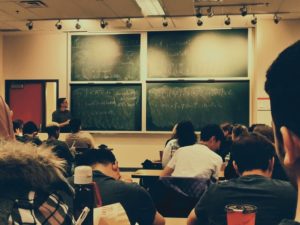The following are excerpts from the University Day Lecture by the late Dr. Riza Bondal of the School of Education and Human Development. She delivered the lecture on August 15, 2008, and these excerpts were published in the January 2009 issue of Universitas.

Civic education is the education that would enable a person to be a good citizen in a polis, that is, a political community, such as the city-state. The use of the term “civic education” implies that a person when left on his own will not spontaneously and naturally become a good citizen; he needs to be helped to become one through education.
A civically educated person then is one who is informed and skilled, and has the values that would lead him to commit himself to responsible and active participation in furthering the common good of the political community.
The civic mission of institutions of higher education
Liberal Education and Civic Engagement, a project of the Ford Foundation’s Knowledge, Creativity and Freedom Program, revealed that institutions of higher education have an important role in promoting civic education. Aside from imparting the best and most relevant competencies for productive contribution to economic development, these institutions should ensure that students acquire the knowledge, skills, and values favorable to the practice of an informed and responsible participatory citizenship.
An important practical implication of this idea is that higher education institutions ought to instill in their students the idea that the competent and ethical exercise of their profession is their means to contributing directly to the common good. It requires the deliberate cultivation of the disposition of service because the promotion of professional competence alone is not necessarily accompanied by the development of the right moral compass.

It is hoped that through their exposure to the different forms of civic engagement, students may be able to achieve at least one of the following desired outcomes during college and to sustain them even after graduation:
- Positive changes in civic knowledge or civic skills
- Positive changes in civic attitudes and civic values
- Increased service and philanthropic activity
- Increased electoral participation
Liberal Education Plus as an ideal vehicle for promoting civic education
Liberal education befits a citizen, who is capable of self-governance in a democracy. Consequently, it has long been viewed as providing the requisite knowledge, skills, and dispositions that are needed for a person to exercise an informed and responsible citizenship.
How can liberal education be a vehicle to promote civic education? We can look at the options available for establishing the links between civic education thrusts and an educational institution’s infrastructure. In this regard, we can consider two aspects. The first refers to how civic education thrusts can be integrated in a liberal education curriculum. The second concerns the level of institutional commitment and support.

As regards the first aspect, the options are the traditional and the contemporary. In the traditional view, liberal education’s goal of preparing students for active citizenship was confined to the classroom setting. The emphasis was on “the development of intellectual skills conducive to critical thinking and reflection, combined with a broad knowledge of history, the social sciences and the workings of civic institutions.” This is particularly true of those disciplines that easily lend to the transmission of knowledge that are indispensable for the exercise of an informed and responsible citizenship in a democracy. Liberal Education and Civic Engagement mentions specific ways the disciplines can contribute to civic education:
- “Some courses can help students make connections between the material they are learning and contemporary social and political issues, which capitalize on the use of critical thinking skills.”
- “Other courses can seek to teach civic skills and knowledge directly—such as how governments work, how various policies affect students’ lives, or how social movements have changed the society in which we live.”
The contemporary initiatives, on the other hand, consist of more choices. In one, civic education thrusts take place in extra-curricular programs. In another, a civic engagement activity is integrated into the curriculum. An example of this is Service Learning. Another example is the effort of Mr. Mirshariff Tillah, a former professor of the Institute of Political Economics, to incorporate Project Citizen, which has an advocacy component, in the subject “Philippine Politics and Governance.”
Need for institutional support

Regarding institutional commitment and support, according to the study Liberal Education and Civic Engagement, the options are diverse. They have a bearing on the college environment, which influences the level and nature of civic engagement in the educational institution.
- The “primary way many colleges actively seek to promote civic engagement is through offices dedicated to the task.” The services offered to students would depend on the directives set by the institution.
- The institutional goals—whether written or unwritten—with respect to the programs that promote civic education will determine the kinds of civic engagement activities that will be encouraged and supported. For example, the focus could be on giving the students some exposure to a type of volunteer work or the goal could be on institutional commitments to promote social justice by committing itself to address a concrete social problem.
I agree with the LEAP report that, while Liberal Education remains relevant, it may have to undergo some changes to meet the challenges in the 21st century realities. There has to be a paradigm shift, which involves discarding the conventional view that liberal education is, by definition, “nonvocational” and that the aims of liberal education can be attained only in the arts and science disciplines. Liberal education thrusts can be incorporated “across every field of college study, including the professional and technical fields.”
I also agree with Derek Bok, who in his book Our Underachieving Colleges includes a chapter on “Preparation for Citizenship.” His basic message is that while liberal education remains relevant, the traditional approach is no longer enough, although a sound liberal education is supposed to promote civic education. In fact, the latter has suffered considerable neglect. He says a lot more can be done. Specifically, there is a need to have greater concerted effort to deliberately promote civic education.

For example, he mentions that “there is recent evidence that professors who try to encourage civic participation can increase the interest and commitment of their students in becoming involved in politics and public issues.” Or academic leaders can encourage more students to participate in service programs by “merely expressing support for these activities.” That includes institutional support: “University officials can also foster active citizenship by encouraging the growth of student government and the use of democratic processes in all extra-curricular organizations.” Or “college officials can also stimulate interest in forthcoming elections and foster knowledge of the issues involved by organizing debates, candidate visits, mock conventions, and other similar activities.” He also suggests that “university presidents…offer leadership by making clear in words and actions that they consider voting an important obligation for every citizen” without this being construed as engaging in partisan politics.
The creed of the University of Asia and the Pacific
I think that everything that I have said today is congruent with what this University upholds. In this regard, I would like to cite some points in our Credo.
The primary purpose of education is the integral formation of the human person, the fullest development of everything that is human in the individual.
A university must be ever attentive and responsive to the real needs of the community that sustains it, seek to significantly contribute to human progress, and do everything it can to uplift the moral, cultural, and material level of the country and region in which it operates.
A university fulfills its role best when it forms individuals who are professionally competent, creative and enterprising, zealous for the common good and capable of making free and morally upright choices, and who can thus act as positive agents of change in society.
To promote civic education responds to these educational commitments.
And by promoting civic education, we are seconding the aspiration of St. Josemaría Escrivá, whose spirit and teachings are a permanent source of inspiration for everything that we are doing in this University.
To the students
“As university students you undoubtedly realize that a university must play a primary role in contributing to human progress. Since the problems facing mankind are multiple and complex (spiritual, cultural, social, financial, etc.) university education must cover all these aspects.
There are thousands of places in the world which need a helping hand, which await someone who is willing to work personally with effort and sacrifice. A university should not form men who will egoistically consume the benefits they have achieved through their studies. Rather it should prepare students for a life of generous help of their neighbor, of Christian charity.” (From Conversations with Msgr. Escrivá)
To those working in this university
“A university must educate its students to have a sense of service to society, promoting the common good with their professional work and their activity. University people should be responsible citizens with a healthy concern for the problems of other people and a generous spirit which brings them to face these problems and to resolve them in the best possible way. It is the task of universities to foster these attitudes in their students.” (From Conversations with Msgr. Escrivá)
St. Josemaría Escrivá reiterates this same point on October 7, 1972 in an academic act to confer the doctoris honoris causa at the University of Navarra.
“The University cannot ignore any uncertainty, any concern, any need of the people. It is not its mission to offer immediate solutions to the problems. But in studying the problems with scientific rigor, it also stirs hearts, shakes off passivity, rouses lethargic forces, and forms citizens who are willing to construct a more just society.”
Banner photo by Gerd Altmann from Pixabay.
Related articles:
Leave a Reply